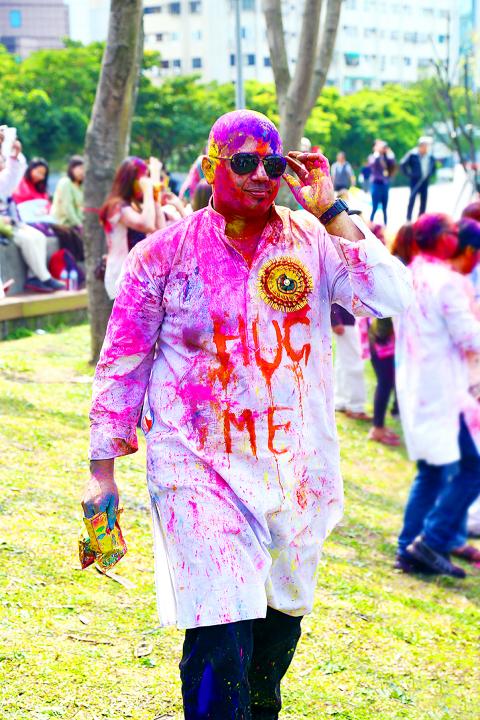Back for the seventh year, the Indian Holi festival will kick off Sunday at Luguang He-an Park (綠光河岸公園) in New Taipei City. Historically, the yearly festival celebrated by Hindus in India marks the beginning of spring. It’s a time when people atone for their wrongdoings and throw colorful paint at each other, expressing their gratitude.
Mayur Srivastava, a festival organizer who also runs the Mayur Indian Kitchen chain in Taipei, says that he expects to see a large turnout this year. In the past, Holi was mostly celebrated by Indian expats in Taiwan, but more Taiwanese and other expats have been attending the festival over the past few years. In addition, new Indian restaurant 3 Idiots Toast & Curry and the Indian Association of Taipei and Taiwan Tamil Sangam Association were involved in planning this year’s event.
“It’s the first time that we’ve seen such a coming together of the Indian community in Taipei,” Srivastava tells the Taipei Times.

Photo courtesy of Mayur Srivastava
One concern that people may have is a recurrence of the incident in summer of 2015 when a fire broke out during a crowded party at Formosa Fun Coast, a waterpark in New Taipei City, due to the use of chemicals in colored powder. However, Srivastava assures attendees that Holi organizers have been using non-toxic, herbal plant-based paint rather than colored powder since that year.
He adds the goal of the festival is to put aside differences and have a good time while meeting new people.
“This message is especially significant given the current political climate globally,” Srivastava says. “There are too many boundaries being drawn across racial and cultural lines.”

Photo courtesy of Mayur Srivastava
Sunday’s event will also feature Bollywood music and dance performances, a lucky draw and a wide selection of Indian food.
“When everyone is covered in paint, skin color [disappears],” Srivastava jokes. “You can’t tell if people are Indian or Taiwanese or American; it just matters that everyone is having a good time.”
It is advisable to bring to the event a change of clean clothing and a zip lock or plastic bag to wrap your phone in.

Photo courtesy of Mayur Srivastava

On April 26, The Lancet published a letter from two doctors at Taichung-based China Medical University Hospital (CMUH) warning that “Taiwan’s Health Care System is on the Brink of Collapse.” The authors said that “Years of policy inaction and mismanagement of resources have led to the National Health Insurance system operating under unsustainable conditions.” The pushback was immediate. Errors in the paper were quickly identified and publicized, to discredit the authors (the hospital apologized). CNA reported that CMUH said the letter described Taiwan in 2021 as having 62 nurses per 10,000 people, when the correct number was 78 nurses per 10,000

As we live longer, our risk of cognitive impairment is increasing. How can we delay the onset of symptoms? Do we have to give up every indulgence or can small changes make a difference? We asked neurologists for tips on how to keep our brains healthy for life. TAKE CARE OF YOUR HEALTH “All of the sensible things that apply to bodily health apply to brain health,” says Suzanne O’Sullivan, a consultant in neurology at the National Hospital for Neurology and Neurosurgery in London, and the author of The Age of Diagnosis. “When you’re 20, you can get away with absolute

When the South Vietnamese capital of Saigon fell to the North Vietnamese forces 50 years ago this week, it prompted a mass exodus of some 2 million people — hundreds of thousands fleeing perilously on small boats across open water to escape the communist regime. Many ultimately settled in Southern California’s Orange County in an area now known as “Little Saigon,” not far from Marine Corps Base Camp Pendleton, where the first refugees were airlifted upon reaching the US. The diaspora now also has significant populations in Virginia, Texas and Washington state, as well as in countries including France and Australia.

May 5 to May 11 What started out as friction between Taiwanese students at Taichung First High School and a Japanese head cook escalated dramatically over the first two weeks of May 1927. It began on April 30 when the cook’s wife knew that lotus starch used in that night’s dinner had rat feces in it, but failed to inform staff until the meal was already prepared. The students believed that her silence was intentional, and filed a complaint. The school’s Japanese administrators sided with the cook’s family, dismissing the students as troublemakers and clamping down on their freedoms — with